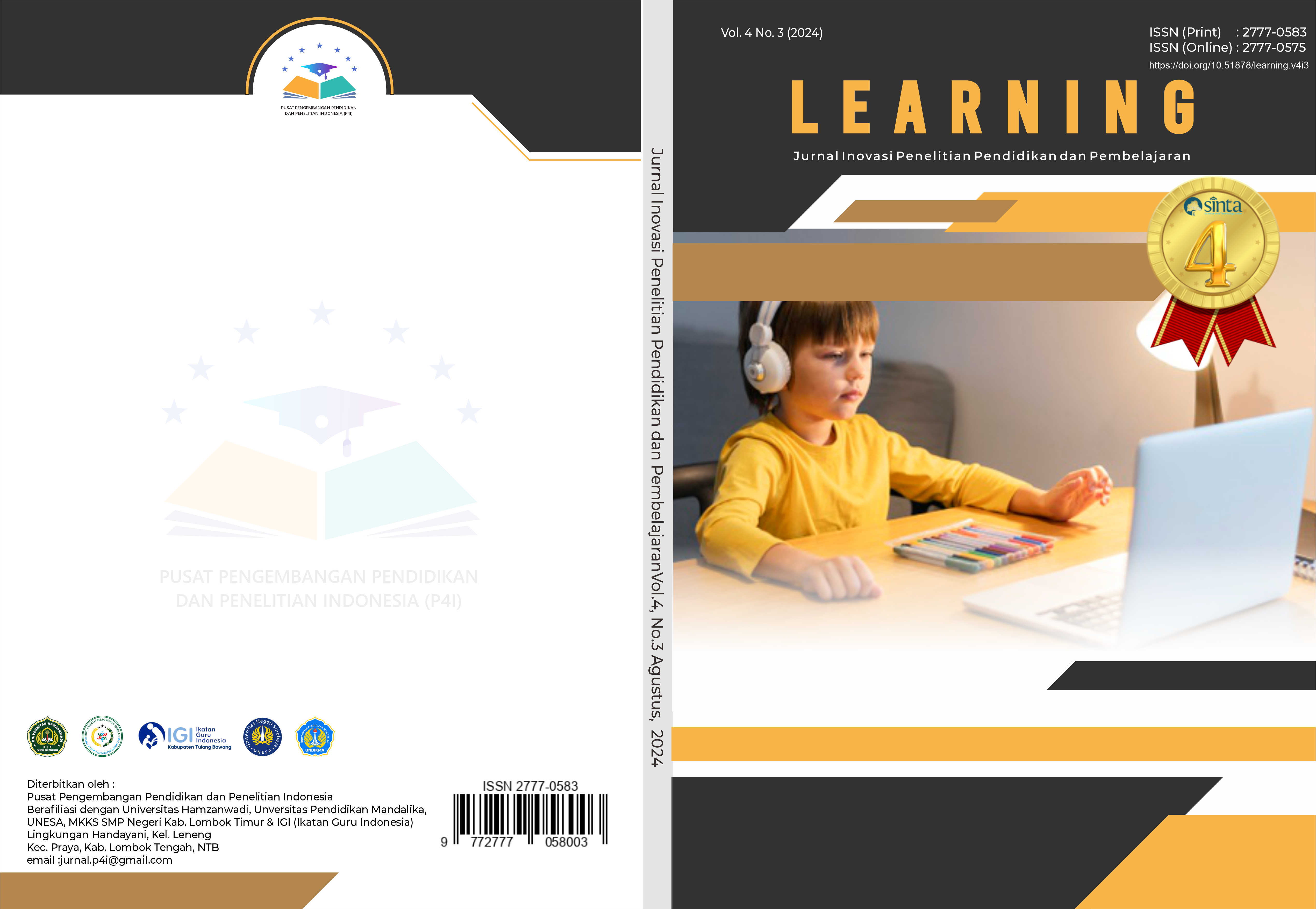PARTISIPASI ALUMNI DALAM MENINGKATKAN MUTU PERGURUAN TINGGI: STUDI KEPUASAN TERKAIT DOSEN, KURIKULUM DAN INFRASTRUKTUR
DOI:
https://doi.org/10.51878/learning.v4i3.3160Keywords:
Alumni, Dosen, Kurikulum, Infrastruktur, Mutu Perguruan TinggiAbstract
The aim of this research is to explore strategies for enhancing the quality of a private higher education, with a specific focus on alumni satisfaction. Factors under examination include lecturer professional, curriculum relevance, and facility quality. Assessing alumni satisfaction is deemed crucial for improving educational services and identifying key factors influencing their contentment. The research methodology employed is qualitative, using Focus Group Discussions (FGD) involving 16 selected participants based on specific criteria. FGD allows for in-depth exchange of ideas and experiences, although it faces challenges in terms of reliability and potential bias. Skillful moderation, participant diversity, open-ended questions, consistent analysis, and accurate recording are utilized to address these weaknesses. The results highlight the pivotal role of alumni in enhancing the quality of higher education institutions by providing valuable feedback. Alumni satisfaction reflects the institution's quality, influenced by lecturer professionalism, facility quality, and infrastructure. Thus, improving higher education quality is directly associated with enhancing lecturer professional, offering quality curriculum, and innovating educational facilities and infrastructure.
ABSTRAK
Tujuan yang hendak dicapai dari penelitian ini adalah untuk mengeksplorasi strategi dalam meningkatkan kualitas perguruan tinggi swasta dengan fokus pada kepuasan alumni. Faktor penentu yang dipelajari termasuk profesionalisme dosen, relevansi kurikulum, dan kualitas fasilitas. Penilaian kepuasan alumni dianggap penting dalam meningkatkan layanan pendidikan dan menentukan faktor-faktor utama yang memengaruhi kepuasan mereka. Metode penelitian yang digunakan adalah kualitatif dengan Focus Group Discussion (FGD) yang melibatkan 16 peserta yang dipilih berdasarkan kriteria tertentu. FGD memungkinkan pertukaran ide dan pengalaman yang mendalam. Keunggulan FGD adalah menghasilkan data kaya dan mengungkap dinamika sosial, meskipun ada tantangan reliabilitas dan potensi bias. Moderator yang terampil, keragaman peserta, pertanyaan terbuka, analisis yang konsisten, dan catatan yang akurat digunakan untuk mengatasi kelemahan. Adapun hasil yang diperoleh menjelaskan bahwa alumni berperan penting dalam meningkatkan kualitas institusi pendidikan tinggi sebagai sumber umpan balik berharga. Kepuasan alumni mencerminkan kualitas institusi, yang dipengaruhi oleh profesionalisme dosen, kualitas fasilitas serta infrastruktur. Dengan demikian meningkatkannya kualitas Perguruan Tinggi berjalan linear dengan peningkatan profesionalisme dosen, kurikulum yang bermutu dan inovasi dalam fasilitas serta infrastruktur pendidikan.
Downloads
References
Abdullateef, A.O., S.S. Mohd Mokhtar, R.Z. Yusoff, 2011. The strategic impact of technology-based CRM on call centers’ performance, Joutnal Internet Banking and Commerce., 16 (1).
Alves H., M. Raposo 2007. Conceptual model of student satisfaction in higher education. Total Quality Management., 18 (5) , pp. 571-588
Ariff M.S.M., N. Zakuan, K. Ismail, 2015. ISO 9001: Implementation in Higher Education: Does it Contributes to he Student Satisfaction? The Role of Service in the Tourism & Hospitality Industry, CRC Press, pp. 57-62
Indonesia, Internasional Journal of Scientific Technology Research, 6 (10)
Cabrera A.F., D.J. Weerts, B.J. Zulick, 2002. Alumni Survey: Three Conceptualizations to Alumni Research Ponencia del Seminario Métodos de Análisis
Cummins B.. 2011. Environmental Scan Illinois State University Strategic Plan https://www.strategicplan.illinoisstate.edu/downloads/Environmental_Scan_Fall_2011_Educating_Illinois.pdf
Delaney A.M., 2004. Ideas to enhance higher education’s impact on graduates’ lives: alumni recommendations Tertiary Education and Management, 10 (2) (2004), pp. 89-105
Recruitment and Retention, Journal of Marketing for Higher Education, 10 (4), pp. 1-11
Gibson A., 2010. Measuring business student satisfaction: a review and summary of the major predictors, Journal of Higher Education Policy and Management, 32 (3)
Grub N., The Roles of Tertiary Colleges and Institutes: Trade-Offs in Restructuring Postsecondary Education, Commissioned paper prepared during a sabbatical period at the OECD Directorate for Education, Paris (2003)
http://www.oecd.org/dataoecd/50/55/35971977.pdf
in college students, Int. Res. Based Educ. J., 1 (2)
Humphreys P., 2018. The Top Five Things that Really Matter to Students about Their universityhttps://www.jisc.ac.uk/news/the-top-five-things-that-really-matter-to-students-about-theiruniversity-07-mar-2018
Jamal A., K. Naser, 2002. Customer Satisfaction and Retail Banking: an Assessment of Some of the Key Antecedents of Customer Satisfaction in Retail Banking, Int. J. Bank Market., 20 (4)
Janssen O.,2000. Job Demands, Perceptions of Effort-reward Fairness, and Innovative Work Behaviour, J. Occup. Organ. Psychol., 73, pp. 287-302
Kardoyo K., A. Nurkhin, I.S. Melati, 2018. A Profile of Master Degree Program Graduates of Economic Education, UNNES: a Tracer Study, International Conference on Science and Education and Technology 2018 (ISET 2018), Atlantis Press (2018)
Perencanaan, Implementasi, dan Pengendalian (Ed. pertama), Salemba Empat, Jakarta
Kwan P.Y.K., P.W.K. Ng, 2021. Quality Indicators in Higher Education in comparing Hong Kong and China’s Students, Manag. Audit J., 14 (1/2), pp. 20-27
Martin A.J., J. Milne-Home, J. Barrett, E. Spalding, G. Jones, 2000.Graduate satisfaction with Universities and Perceived Employment Preparation, J. Educ. Work, 13 (2) , p. 19921
Education Policy Analysis
Paul S., What Are the Influencing Factors for Quality Education? (2019) https://ukcurriculumschools.wordpress.com/2019/01/14/what-are-the-influencing-factors-forquality-education/
Petratos S., A.P. Calitz, 2019. Evaluating Alumni Stisfaction in The School of ICT, Forewords: Sacla 2019 Proceed., 190
SQM G.C., 2007. First Call Resolution Revisited: Why it Still Matters Most, and How to Improve it, Industry Reports
Sudiro, Profesionalisme Dosen (2010)https://rumahpendidikan.files.wordpress.com//
Sudirtha I.G., 2013. Profil Alumni Fakultas Teknik dan Kejuruan Universitas Pendidikan Ganesha ditinjau Dari keterserapannya di dunia kerja, Jurnal Pendidikan Teknologi dan Kejuruan, 10 (1)
Suwartana I.M., 2011. Kontribusi Kualitas Penerapan Sistem Manajemen Mutu ISO 9001: 2008 Terhadap Penyelenggaraan Pendidikan di SMK Negeri 3 Singaraja, Jurnal Administrasi Pendidikan, 2 (2)
Tuan N.M., 2012. Effects of Service Quality and Price Fairness on Student Satisfaction, Int. J. Bus. Soc. Sci., 3 (19), pp. 132-150
Zhu F.X., W. Wymer, I. Chen. 2002. IT-Based Services and Service Quality in Consumer Banking, Int. J. Serv. Ind. Manag., 13 (1) pp. 69-90
Downloads
Published
How to Cite
Issue
Section
License
Copyright (c) 2024 LEARNING : Jurnal Inovasi Penelitian Pendidikan dan Pembelajaran

This work is licensed under a Creative Commons Attribution-ShareAlike 4.0 International License.
















